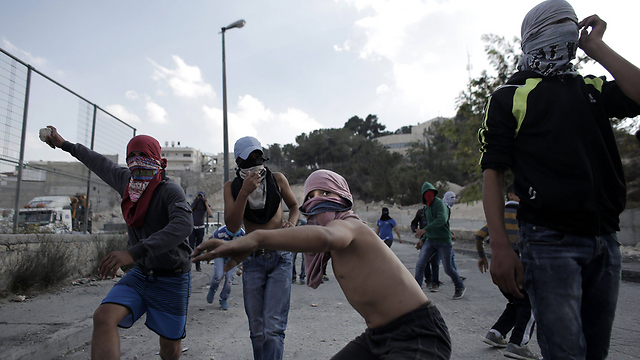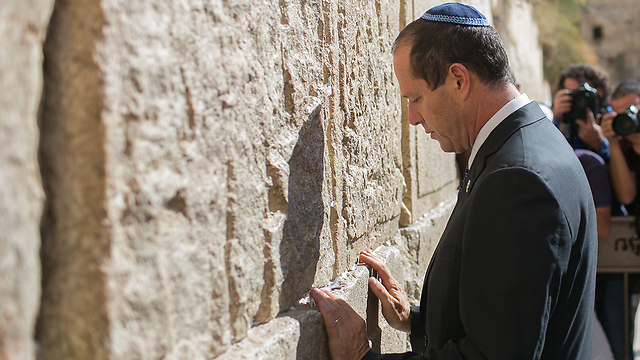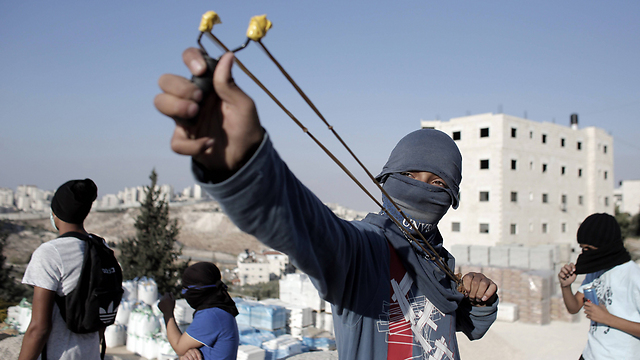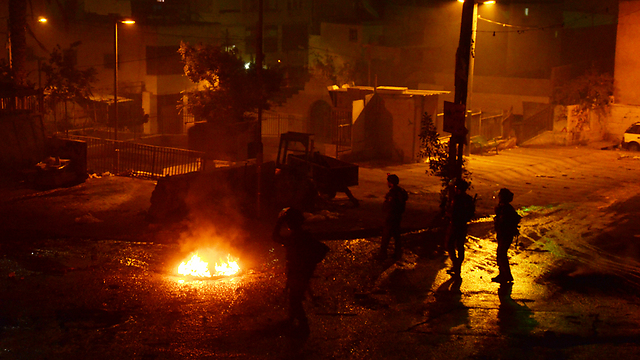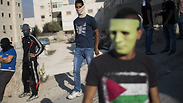
Jerusalem mayor vows to restore peace
Nir Barkat says Israel 'must fight violence' in wake of terrorist attack, as police bolsters forces in bid to thwart weekend violence.
Barkat said the violence in the city had become intolerable, and he vowed to restore order.
"Yesterday what we saw is another higher level, of people running over a three-month-old baby," he told The Associated Press. "We must fight violence and we will win that war."
Police and Magen David Adom emergency crews were placed on high alert ahead of the weekend's Friday prayers and large forces will secure the Old City and other flashpoints across Jerusalem in the early morning hours.
Police forces have also prepared for the possibility that radical Jews would attempt to retaliate against Arabs, after 3-month-old baby, Israeli-American Haya Zissen Braun, was killed in a terror attack on a light rail station in the capital.
The deadly attack Wednesday night escalated already heightened tensions in East Jerusalem.
Since the summer, Palestinian youths have clashed frequently with Israeli police, thrown stones and firebombs at Israeli motorists and disrupted service of the city's light rail train – a service meant to unify the city.
Barkat has a particularly sensitive job, presiding over a diverse city that includes secular and observant Jews, an insular ultra-Orthodox Jewish community and more than 200,000 Palestinians. It is a cauldron of conflicting interest groups that frequently boils over into unrest.
The latest unrest has created perhaps the biggest crisis for Barkat, a former high-tech entrepreneur, during his six years in office.
The violence erupted over the summer after three Israeli teenagers were kidnapped and killed by Hamas militants in the West Bank. Jewish extremists retaliated by kidnapping and burning to death a Palestinian teenager in east Jerusalem, sparking violent riots.
The unrest continued throughout the summer after Israel attacked Gaza in response to heavy Hamas rocket fire. The arrival of Jewish nationalists into the heart of an Arab neighborhood, coupled with clashes at Jerusalem's most sensitive holy site, have further fueled the flames.
The driver of the car in Wednesday's attack, identified as Abdel Rahman al-Shaludi, was a Palestinian from east Jerusalem who had served time in prison for militant activities. He was shot by police as he tried to run away and later died from his wounds.
Overnight and early Thursday, police broke up unrest in several Arab neighborhoods, Rosenfeld said. No major violence was reported, though authorities were bracing for trouble during Friday's weekly noon Muslim prayers, a time when clashes frequently erupt.
The violence and disorder in Silwan continued to intensify on Thursday night, as hundreds of local residents clashed with Border Police units. Veiled assailants lit tires, and threw Molotov cocktails and fireworks at the police forces.
The Border Guard responded with concussion grenades, tear gas, and rubber bullets.
In a separate incident, veiled assailants fired fireworks at a structure recently inhabited by a Jewish family. Police arrested 12 suspects for violent disorder.
"This time we will not concede," said Ahmed, a local resident, "We will continue to attack police forces until they leave us alone. We will sacrifice our lives for the Al-Aqsa Mosque and all of east Jerusalem."
He emphasized: "They cannot deter us by firing on us – it only makes us stronger."
Another resident added, "The Israeli government is shooting itself in the foot, and it better not intervene here. Every attack on us will cost it dearly."
"We have a peak of terror, and the use of violence in Jerusalem in the last few months," Barkat said. "We will deal with it and we'll make sure it's dramatically decreased, and it'll happen very, very soon."
Palestinians say they suffer discrimination when it comes to housing and municipal services, and they consider Israeli actions in east Jerusalem as provocations.
Barkat rejected such suggestions, saying there is no excuse for the violence.
He said he frequently works quietly with Arab leaders to maintain calm, and that many Arab neighborhoods have thrived with new roads and schools during his term by working with municipal authorities. But he said investment can only take place if the city is quiet.
"The majority of Arab residents in Jerusalem, they don't want the city divided, they understand exactly what they gain by the united city of Jerusalem," he said. "There's no way it will ever function, God forbid, as a divided city."
Omri Efraim, Hassan Shaalan, Noam (Dabul) Dvir, and the Associated Press contributed to this report.










